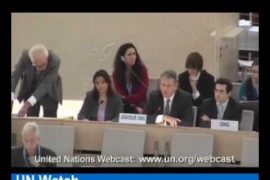1) At the INSS Remi Daniel and Gallia Lindenstrauss explain why ‘Erdogan’s “Crazy Project” Raises Concerns’.
“Turkish President Recep Tayyip Erdogan is promoting the idea of building the Istanbul Canal between the Black Sea and the Sea of Marmara as a waterway parallel to the Bosphorus Strait. The idea itself is not new, but Erdogan hopes that its realization will be one of the major achievements of his presidency. Facing him, Mayor of Istanbul Ekrem Imamoglu, who was elected to the post in spite of the President’s strong support for another candidate, is one of the leading opponents of the project. The main argument against the canal is that it will cause serious damage to the environment, and troubling scenarios also foresee an impact on the countries around the Mediterranean, including Israel.”
2) Jonathan Spyer discusses ‘Syria’s Wild South west’.
“The global spotlight has currently returned to Syria because of the Assad regime’s current bloody offensive in Idlib, Aleppo and Latakia Provinces. The regime is trying to reduce the last enclave held by the Sunni Arab rebels in the country’s north-west. The assault has precipitated one of the worst humanitarian disasters of the bloody, nine year war. 800,000 people have left their homes to flee the advance of regime forces and the relentless, indiscriminate bombing of Assad’s Russian allies.
Far to the south of Idlib, however, and largely ignored by the global media, events are under way which may offer a clue to the future direction of Syria. These events are of direct interest to Israel. The regime is currently seeking to consolidate its presence in Deraa and Quneitra provinces in Syria’s south west. Assad’s army completed its ‘conquest’ of these areas in the summer of 2018. Observation of the current situation on the ground in these areas suggests, however, that the situation remains far from a return to the repressive and stifling order of the pre-revolt days.”
3) The ITIC analyses ‘The Tenth Round of Escalation in the Gaza Strip’.
“On February 23 and 24, 2020, there was another significant round of escalation in the Gaza Strip, the tenth since the beginning of the return marches (March 30, 2018). It was instigated by the Palestinian Islamic Jihad (PIJ) in retaliation for the IDF’s killing of one of its operatives who was placing an IED near the border security fence and the subsequent removal of his body with an IDF bulldozer. During the round of escalation 113 rocket and mortar shells were fired at the Israeli communities near the Gaza Strip and at the southern Israeli cities of Sderot and Ashqelon. In response the IDF attacked PIJ terrorist targets in the Gaza Strip and Syria. Two PIJ operatives were killed in the attack near Damascus; no operatives were killed in the attacks on the Gaza Strip. Near midnight on February 24, 2020, the PIJ announced it had completed its retaliation for the death of its operatives. When the rocket fire ceased the IDF stopped attacking in the Gaza Strip.”
4) The JCPA has published a collection of essays titled ‘Israelophobia and the West: The Hijacking of Civil Discourse on Israel and How to Rescue It’.
“This volume evaluates the intensifying anti-Semitism against diaspora Jewry in Western countries and the converging rhetorical assaults on “sovereign” Jews in Israel – condemning them and their nation-state as “Nazi, apartheid, racist, genocidal, war criminal, illegal, illegitimate, colonialist, and anachronistic.” This invective has been characterized and justified as legitimate political criticism of Israel in mainstream Western discourse. It has become standard practice among faculty and “pro-Palestinian” student organizations on American university campuses, the United Nations, associated international bodies such as the International Court of Justice and the International Criminal Court, as well as European institutions and parliaments. For the first time, anti-Semitic tropes cloaked as political critique of Israel have even been voiced by several members of the U.S. House of Representatives.”





